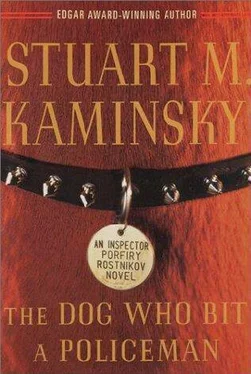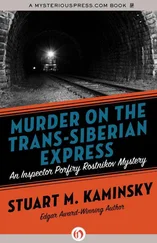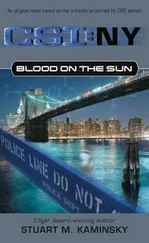Stuart Kaminsky - The Dog Who Bit a Policeman
Здесь есть возможность читать онлайн «Stuart Kaminsky - The Dog Who Bit a Policeman» весь текст электронной книги совершенно бесплатно (целиком полную версию без сокращений). В некоторых случаях можно слушать аудио, скачать через торрент в формате fb2 и присутствует краткое содержание. Жанр: Полицейский детектив, на русском языке. Описание произведения, (предисловие) а так же отзывы посетителей доступны на портале библиотеки ЛибКат.
- Название:The Dog Who Bit a Policeman
- Автор:
- Жанр:
- Год:неизвестен
- ISBN:нет данных
- Рейтинг книги:3 / 5. Голосов: 1
-
Избранное:Добавить в избранное
- Отзывы:
-
Ваша оценка:
- 60
- 1
- 2
- 3
- 4
- 5
The Dog Who Bit a Policeman: краткое содержание, описание и аннотация
Предлагаем к чтению аннотацию, описание, краткое содержание или предисловие (зависит от того, что написал сам автор книги «The Dog Who Bit a Policeman»). Если вы не нашли необходимую информацию о книге — напишите в комментариях, мы постараемся отыскать её.
The Dog Who Bit a Policeman — читать онлайн бесплатно полную книгу (весь текст) целиком
Ниже представлен текст книги, разбитый по страницам. Система сохранения места последней прочитанной страницы, позволяет с удобством читать онлайн бесплатно книгу «The Dog Who Bit a Policeman», без необходимости каждый раз заново искать на чём Вы остановились. Поставьте закладку, и сможете в любой момент перейти на страницу, на которой закончили чтение.
Интервал:
Закладка:
Throughout my vagrant destiny
Moscow my thoughts have turned to thee.’ ”
Rostnikov continued with:
“ ‘Moscow. . what thoughts in each true-hearted Russian come flooding at that word.
How deep an echo there is heard.’ ”
Rostnikov turned to face the dark young man in black slacks and a black zipper jacket. The young man was handsome and slender.
He looked up at Pushkin.
“He wrote that a long time ago, when times were different,” said the young man.
“But you know the words,” said Rostnikov.
“Once I believed them. Once I wanted to be a poet. But there is no market for poets.”
“There never has been,” said Rostnikov, “yet they strive, survive, and breed. Perhaps they are born with a deviant gene.”
“Perhaps,” said the young man. “When we get in the car, you will be searched. If you are wearing a listening device or recorder, we will find it. If you are carrying a weapon, it will be taken, you will be asked to get out, and we will be gone.”
“I carry no weapon. I carry no electronic or recording device,”
said Rostnikov.
The man nodded, looked around, lifted his right hand to his head as if to smooth back his hair. No more than five seconds later, a modest black Zil pulled up, stopping traffic behind it. The windows of the car were tinted. The young man led the way to the car and opened the back door. Rostnikov slipped in awkwardly, pulling in his prosthetic leg a fraction of a second before the young man closed the door.
The car started. The young man remained behind on the street.
At Rostnikov’s left was a pale, thin, young, and quite ugly man with large teeth and a matching nose. The man wore a black zipper jacket exactly like the one worn by the man Rostnikov had spoken to moments earlier.
The driver didn’t turn around. All that Rostnikov could see of him was his recently cut dark hair and his bull neck.
The thin young man said nothing and showed no emotion as he patted Rostnikov down, checking his wallet and even the paperback novel in the inspector’s pocket. He went so far as to examine Porfiry Petrovich’s artificial leg for secret compartments or listening devices. Satisfied, the ugly man reached over and touched the shoulder of the driver, who turned right at the next corner.
Halfway down the narrow street the car stopped and the ugly man reached over to open Rostnikov’s door. Rostnikov obliged by stepping out, which, given his leg, took a bit of time.
As soon as he had cleared the door, it closed and Porfiry Petrovich found himself on an empty street of houses and shops with boarded-up windows. There was another car, black, tinted windows, not large, parked directly across the street. The rear door to the car opened and Rostnikov proceeded to the car and climbed in.
He closed his door himself and looked over at the man at his side, as the car started and moved at a reasonable pace up the street.
“You wish to talk to me,” the man said.
He was about Rostnikov’s height but much lighter. He was also about Rostnikov’s age but looked much older. His hair was thin and straight. His skin, already dark, was weathered and wrinkled by the sun. The face, however, was dominated by a black patch that covered the man’s right eye. All these things Rostnikov had known about Casmir Chenko, Glahz, the Tatar.
“Valentin Lashkovich,” said Rostnikov, trying to find a comfortable position and keep his eyes on Chenko. “You know he is dead.”
“I know,” said Chenko.
“Do you also know who killed him?”
“The Chechin,” said Chenko.
“Shatalov?” asked Rostnikov.
“Shatalov,” said Chenko. “He uses no other name, so one of my men called him Irving. We all call him that now. Shatalov knows and it displeases him. We have reason to believe he is a Jew. So you see, Chief Inspector, we Tatars do have a sense of humor, perhaps not a profound one, but a sense of humor nonetheless. And we are not stupid, or foul-smelling, or particularly sullen.”
“I never thought you were,” said Rostnikov.
Chenko, who had sat forward when he spoke, now leaned back.
“What do you want, policeman?”
“You are going to kill one of Shatalov’s men in retaliation,” said Rostnikov as the car drove past the old Tretyakov Art Gallery.
“And you don’t want me to do it?” said Chenko.
“That is right,” said Rostnikov.
“This began when Shatalov killed one of my men two months ago,” said Chenko calmly. “Shot him in a hotel sauna. You knew that?”
“I knew that,” said Rostnikov. “I mean I knew that one of your men was murdered. I do not know that Shatalov did it. I have some reason to believe that it may indeed be someone else.”
“Who else?” asked Chenko.
“Another Mafia that wants you two to kill each other off so they can move in on your territories when you are both weak,” said Rostnikov. “A lone man, perhaps a member of one of your organizations, who sees an opportunity for advancement if a war breaks out between you. Perhaps. .”
“You are groping for diamonds in the Siberian tundra,” said Chenko. “Shatalov did it.”
“And you did it back and he did it back. And now it will continue.”
“I have not yet answered his affront. If someone has killed one or more of his people, let him look to his own organization. For the last time, policeman, what do you want?”
“A meeting between you and Shatalov.”
“I do not think that a good idea,” said Chenko.
“All right then, a promise from you that there will be no violence, no retaliation for Laskovich’s murder, not till my office has time to investigate.”
“That might be possible,” said Chenko, “if no more of my people are attacked by the Chechins, though I see no good that can come from a one-sided truce.”
“I will try to arrange a truce with a time limit,” said Rostnikov.
“You want something in return. You would not have agreed to see me if you didn’t want something.”
“The body of Valentin Lashkovich,” said Chenko. “Tonight. To be delivered to this location.”
Chenko handed Rostnikov a card. It contained a name and address of a well-known mortuary known to be used by criminals at all levels. It was more than suspected that the mortuary did more than handle the internment of the publicly dead. A large number of people who had unfortunately displeased criminals had disappeared, supposedly into unmarked graves far outside the city. Dis-posing of the dead was now big business in Moscow.
“It shall be,” said Rostnikov. “I have your word?”
“Under the conditions and if the Chechin agrees to the same terms,” said Chenko. “You are going to meet with Shatalov?”
“Yes,” said Rostnikov.
Chenko opened a small zipper bag on the floor, took out a cell phone, dialed, and handed it to Rostnikov.
“A woman will answer,” said Chenko. “Tell her who you are. Tell her you have a message that must be delivered in person.”
Chenko handed the phone to Rostnikov. A woman’s voice said,
“Yes?” Rostnikov said what Chenko had told him to say and gave his office phone number. “I do not know any Shatalov,” the woman said.
“The message remains,” said Rostnikov.
Chenko reached over and took the phone from Porfiry Petrovich. “Natalya, daughter of a snake,” he said. “Tell Irving I will hang his head over my desk.”
Chenko pressed a button on the phone and put it back in the zipper bag.
“You think that will make it more likely that Shatalov will call me?” asked Rostnikov.
“It will make your request undeniable,” said Chenko. “Shatalov will be angry. Shatalov will want to save face. Shatalov will call you, meet with you, and give you a message for me. It will be a warning.
Читать дальшеИнтервал:
Закладка:
Похожие книги на «The Dog Who Bit a Policeman»
Представляем Вашему вниманию похожие книги на «The Dog Who Bit a Policeman» списком для выбора. Мы отобрали схожую по названию и смыслу литературу в надежде предоставить читателям больше вариантов отыскать новые, интересные, ещё непрочитанные произведения.
Обсуждение, отзывы о книге «The Dog Who Bit a Policeman» и просто собственные мнения читателей. Оставьте ваши комментарии, напишите, что Вы думаете о произведении, его смысле или главных героях. Укажите что конкретно понравилось, а что нет, и почему Вы так считаете.












